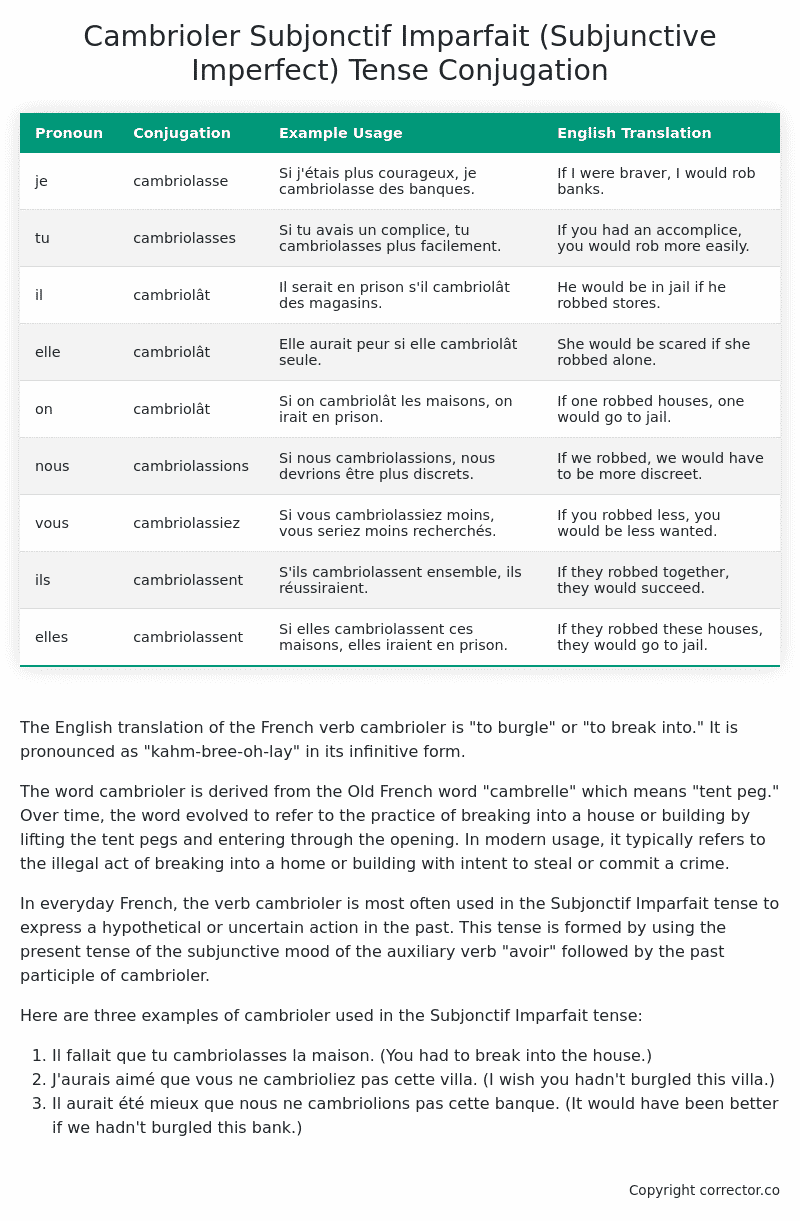Subjonctif Imparfait (Subjunctive Imperfect) Tense Conjugation of the French Verb cambrioler
Introduction to the verb cambrioler
The English translation of the French verb cambrioler is “to burgle” or “to break into.” It is pronounced as “kahm-bree-oh-lay” in its infinitive form.
The word cambrioler is derived from the Old French word “cambrelle” which means “tent peg.” Over time, the word evolved to refer to the practice of breaking into a house or building by lifting the tent pegs and entering through the opening. In modern usage, it typically refers to the illegal act of breaking into a home or building with intent to steal or commit a crime.
In everyday French, the verb cambrioler is most often used in the Subjonctif Imparfait tense to express a hypothetical or uncertain action in the past. This tense is formed by using the present tense of the subjunctive mood of the auxiliary verb “avoir” followed by the past participle of cambrioler.
Here are three examples of cambrioler used in the Subjonctif Imparfait tense:
- Il fallait que tu cambriolasses la maison. (You had to break into the house.)
- J’aurais aimé que vous ne cambrioliez pas cette villa. (I wish you hadn’t burgled this villa.)
- Il aurait été mieux que nous ne cambriolions pas cette banque. (It would have been better if we hadn’t burgled this bank.)
Table of the Subjonctif Imparfait (Subjunctive Imperfect) Tense Conjugation of cambrioler
| Pronoun | Conjugation | Example Usage | English Translation |
|---|---|---|---|
| je | cambriolasse | Si j’étais plus courageux, je cambriolasse des banques. | If I were braver, I would rob banks. |
| tu | cambriolasses | Si tu avais un complice, tu cambriolasses plus facilement. | If you had an accomplice, you would rob more easily. |
| il | cambriolât | Il serait en prison s’il cambriolât des magasins. | He would be in jail if he robbed stores. |
| elle | cambriolât | Elle aurait peur si elle cambriolât seule. | She would be scared if she robbed alone. |
| on | cambriolât | Si on cambriolât les maisons, on irait en prison. | If one robbed houses, one would go to jail. |
| nous | cambriolassions | Si nous cambriolassions, nous devrions être plus discrets. | If we robbed, we would have to be more discreet. |
| vous | cambriolassiez | Si vous cambriolassiez moins, vous seriez moins recherchés. | If you robbed less, you would be less wanted. |
| ils | cambriolassent | S’ils cambriolassent ensemble, ils réussiraient. | If they robbed together, they would succeed. |
| elles | cambriolassent | Si elles cambriolassent ces maisons, elles iraient en prison. | If they robbed these houses, they would go to jail. |
Other Conjugations for Cambrioler.
Le Present (Present Tense) Conjugation of the French Verb cambrioler
Imparfait (Imperfect) Tense Conjugation of the French Verb cambrioler
Passé Simple (Simple Past) Tense Conjugation of the French Verb cambrioler
Passé Composé (Present Perfect) Tense Conjugation of the French Verb cambrioler
Futur Simple (Simple Future) Tense Conjugation of the French Verb cambrioler
Futur Proche (Near Future) Tense Conjugation of the French Verb cambrioler
Plus-que-parfait (Pluperfect) Tense Conjugation of the French Verb cambrioler
Passé Antérieur (Past Anterior) Tense Conjugation of the French Verb cambrioler
Futur Antérieur (Future Anterior) Tense Conjugation of the French Verb cambrioler
Subjonctif Présent (Subjunctive Present) Tense Conjugation of the French Verb cambrioler
Subjonctif Passé (Subjunctive Past) Tense Conjugation of the French Verb cambrioler
Subjonctif Imparfait (Subjunctive Imperfect) Tense Conjugation of the French Verb cambrioler (this article)
Subjonctif Plus-que-parfait (Subjunctive Pluperfect) Tense Conjugation of the French Verb cambrioler
Conditionnel Présent (Conditional Present) Tense Conjugation of the French Verb cambrioler
Conditionnel Passé (Conditional Past) Tense Conjugation of the French Verb cambrioler
L’impératif Présent (Imperative Present) Tense Conjugation of the French Verb cambrioler
L’infinitif Présent (Infinitive Present) Tense Conjugation of the French Verb cambrioler
Struggling with French verbs or the language in general? Why not use our free French Grammar Checker – no registration required!
Get a FREE Download Study Sheet of this Conjugation 🔥
Simply right click the image below, click “save image” and get your free reference for the cambrioler Subjonctif Imparfait tense conjugation!

Cambrioler – About the French Subjonctif Imparfait (Subjunctive Imperfect) Tense
Formation
Common Everyday Usage Patterns
Interactions with Other Tenses
Subjonctif Présent
Indicatif Passé Composé
Conditional
Conditional Perfect
Summary
I hope you enjoyed this article on the verb cambrioler. Still in a learning mood? Check out another TOTALLY random French verb conjugation!


